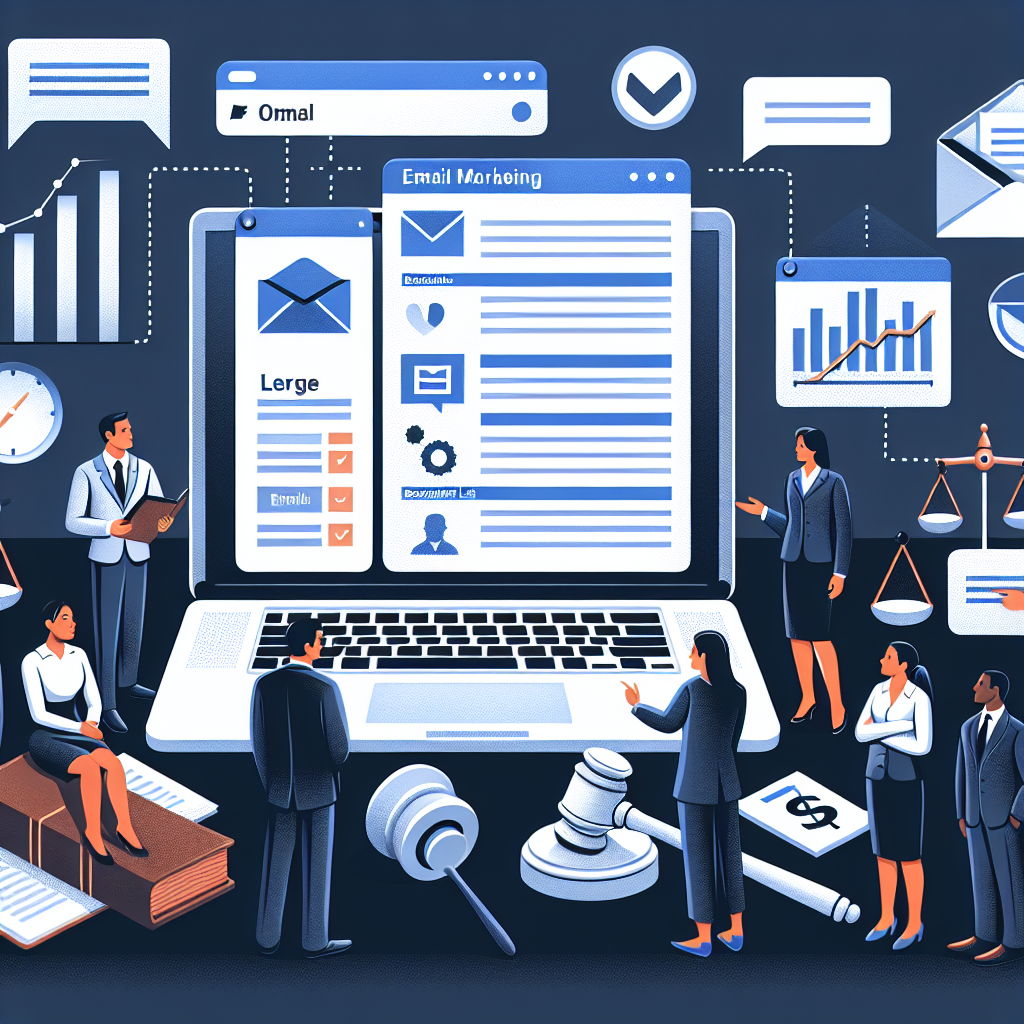Leveraging Email Marketing for Effective Communication in Large Legal Practices

Introduction
In today’s digital landscape, effective communication is paramount for large legal practices seeking to maintain client relationships and streamline internal operations. Leveraging email marketing offers a strategic approach to enhance communication efforts, allowing firms to deliver timely updates, share valuable insights, and promote services directly to clients and prospects. By utilizing targeted email campaigns, legal practices can ensure that their messages resonate with specific audiences, fostering engagement and building trust. This introduction explores the significance of email marketing as a powerful tool for large legal practices, highlighting its potential to improve client outreach, enhance brand visibility, and drive overall business growth.
Building a Targeted Email List for Legal Practices
Creating a targeted email list is essential for effective communication in legal practices. Here’s a straightforward guide to building and maintaining a successful email list:
- Identify Your Target Audience
- Who to Include:
- Current clients
- Potential clients
- Referral sources
- Industry partners
- Understand Their Needs:
- Know their demographics, interests, and legal needs to tailor your messaging.
- Who to Include:
- Gather Email Addresses
- Create Valuable Content:
- Offer free resources (e-books, whitepapers, newsletters) in exchange for email sign-ups.
- Host Webinars or Workshops:
- Provide educational sessions on relevant legal topics to attract attendees and collect contact information.
- Create Valuable Content:
- Leverage Social Media
- Promote Your Content:
- Use platforms like LinkedIn, Facebook, and Twitter to drive traffic to your website where people can subscribe.
- Engage with Followers:
- Create interactive posts or polls to foster community and encourage email sign-ups.
- Promote Your Content:
- Streamline the Sign-Up Process
- Make It Easy:
- Use a simple sign-up form on your website with minimal fields to reduce barriers to entry.
- Clear Call-to-Action:
- Highlight the benefits of subscribing to motivate potential subscribers.
- Make It Easy:
- Maintain Email List Quality
- Regularly Clean the List:
- Remove inactive subscribers to improve engagement and maintain relevance.
- Segment Your List:
- Group contacts based on criteria like practice areas or client types for more personalized communication.
- Regularly Clean the List:
- Ensure Compliance with Regulations
- Follow Legal Guidelines:
- Adhere to GDPR and CAN-SPAM Act requirements by ensuring subscribers opt in to receive communications.
- Offer Preferences:
- Provide options for subscribers to manage their preferences or unsubscribe easily.
- Follow Legal Guidelines:
- Engage Continuously
- Provide Value:
- Regularly send valuable content and personalized messages to keep subscribers interested and engaged.
- Cultivate Relationships:
- Focus on building lasting relationships that enhance client loyalty and drive growth.
- Provide Value:
Crafting Compelling Email Content for Client Engagement
Effective email marketing is crucial for large legal practices to engage clients. Here’s a straightforward guide to creating compelling email content that captures attention and encourages interaction:
- Understand Your Audience
- Segment Your Email List:
- Group clients based on criteria like practice area, history, or engagement level.
- Tailor Messages:
- Create content that resonates with specific client groups, ensuring relevance and value.
- Segment Your Email List:
- Craft an Engaging Subject Line
- First Impression Matters:
- The subject line determines if the email gets opened.
- Be Concise and Informative:
- Use clear language to indicate the email’s purpose (e.g., “Essential Updates on Your Case”).
- First Impression Matters:
- Maintain a Professional Yet Approachable Tone
- Avoid Legal Jargon:
- Use clear, straightforward language to enhance understanding.
- Incorporate a Conversational Style:
- This personal touch encourages clients to respond or ask questions.
- Avoid Legal Jargon:
- Structure the Email for Easy Reading
- Use Short Paragraphs and Bullet Points:
- Break up text to make it digestible.
- Organize Content Logically:
- Ensure key points are easy to grasp for a better client experience.
- Use Short Paragraphs and Bullet Points:
- Incorporate Visual Elements
- Use Relevant Images and Infographics:
- Visuals help illustrate complex concepts and make information more accessible.
- Ensure Mobile-Friendliness:
- Design emails to be easily viewable on smartphones and tablets.
- Use Relevant Images and Infographics:
- Include a Strong Call to Action (CTA)
- Guide Clients on Next Steps:
- Use clear CTAs (e.g., “Schedule a Consultation,” “Download Our Resource”).
- Encourage Action:
- Make it easy for clients to engage further, fostering connection.
- Guide Clients on Next Steps:
Automating Email Campaigns for Efficiency in Legal Firms

Automating email campaigns can greatly enhance communication in large legal practices. Here’s how it benefits firms:
- Consistent Client Communication
- Automated Reminders:
- Schedule reminders for appointments, court dates, and deadlines to keep clients informed.
- Timely Updates:
- Use automated follow-up emails to provide case updates, fostering trust and transparency.
- Automated Reminders:
- Effective Audience Segmentation
- Tailored Communications:
- Categorize clients based on specific needs or case types.
- Targeted Messaging:
- Send relevant content to different client groups (e.g., divorce vs. custody cases) to increase engagement.
- Tailored Communications:
- Streamlined Internal Communication
- Automated Newsletters:
- Schedule internal updates to keep all team members informed about case strategies and meetings.
- Reduced Miscommunication:
- Ensure everyone receives the same information simultaneously, promoting collaboration and efficiency.
- Automated Newsletters:
- Data-Driven Insights
- Analytics Tracking:
- Monitor open rates, click-through rates, and responses to evaluate communication effectiveness.
- Refining Strategies:
- Use data to understand which messages resonate most and adjust content accordingly.
- Analytics Tracking:
- Enhanced Client Relationships
- Proactive Engagement:
- Maintain ongoing communication that demonstrates commitment to client needs.
- Improved Satisfaction:
- Clients feel valued and informed, which enhances their overall experience with the firm.
- Proactive Engagement:
- Strategic Advantage
- Increased Efficiency:
- Automation frees up time for legal professionals to focus on their core responsibilities.
- Competitive Edge:
- Embracing technology positions firms to thrive in a competitive legal landscape.
- Increased Efficiency:
Read More: Why Law Firms Should Invest in Email Marketing for Business Growth
Analyzing Email Marketing Metrics to Improve Communication
In large legal practices, analyzing email marketing metrics is essential for enhancing communication and building stronger client relationships. Here are key metrics to focus on:
- Open Rates
- Definition: Percentage of recipients who open the email.
- Significance: Indicates the effectiveness of subject lines and overall email appeal.
- Action: Experiment with different subject lines and sending times to improve open rates.
- Click-Through Rates (CTR)
- Definition: Percentage of recipients who click on links within the email.
- Significance: Shows how well the content resonates with the audience.
- Action: Analyze which links get the most clicks to tailor future content to audience interests.
- Bounce Rates
- Definition: Percentage of emails that cannot be delivered to recipients.
- Significance: High bounce rates can harm the firm’s sender reputation.
- Action: Regularly clean and update the email list to ensure accurate delivery.
- Unsubscribe Rates
- Definition: Percentage of recipients who opt out of receiving future emails.
- Significance: A spike in unsubscribes may indicate content issues.
- Action: Adjust strategies based on feedback; consider segmenting lists for more personalized communications.
- Conversion Rates
- Definition: Percentage of recipients who take a desired action (e.g., scheduling a consultation).
- Significance: Measures the effectiveness of email campaigns in driving actions.
- Action: Identify high-performing email types and replicate successful strategies to boost conversions.
Personalizing Email Outreach to Enhance Client Relationships
In large legal practices, personalizing email outreach is essential for building strong client relationships. Here’s how to do it effectively:
- Understand Your Clients
- Gather Data: Collect information about clients’ legal history, preferences, and communication styles.
- Segment Clients: Group clients based on their specific needs (e.g., family law vs. corporate law) to tailor messages.
- Craft Targeted Messages
- Personalized Content: Go beyond using clients’ names; tailor the entire email content.
- Specific Subject Lines: Use subject lines that reflect clients’ interests, such as “Important Family Law Updates for Your Case” instead of generic titles.
- Optimize Timing
- Engagement Timing: Understand when clients are most likely to open emails.
- Adjust Send Times: For corporate clients, send emails during business hours; for personal clients, consider evenings or weekends.
- Acknowledge Client Milestones
- Celebrate Important Dates: Send emails for anniversaries, birthdays, or case resolutions.
- Build Rapport: Small gestures, like congratulating clients on case outcomes, show that you value them beyond just business.
- Solicit Feedback
- Invite Client Opinions: Ask clients for their thoughts on your services through personalized emails.
- Demonstrate Commitment: Show that you are dedicated to continuous improvement and value their input.
Compliance Considerations for Email Marketing in the Legal Sector
In legal practices, effective communication through email marketing is vital, but it comes with strict regulations and ethical responsibilities. Here are key compliance considerations for email marketing in the legal sector:
- Understand Relevant Regulations
- CAN-SPAM Act:
- Provides guidelines for commercial email communications.
- Requires clear opt-out options, sender’s physical address, and non-deceptive subject lines.
- Adhering to these rules builds client trust and avoids penalties.
- General Data Protection Regulation (GDPR):
- Requires explicit consent from individuals before sending marketing emails, especially for firms serving clients in the EU.
- Firms must manage consent effectively and inform clients about data usage.
- CAN-SPAM Act:
- Prioritize Ethical Communication
- American Bar Association (ABA) Guidelines:
- Emphasize professionalism in all communications.
- Focus on providing valuable, educational content rather than aggressive solicitation.
- Position the firm as a trusted advisor to foster long-term relationships.
- American Bar Association (ABA) Guidelines:
- Utilize Segmentation for Relevance
- Tailored Communications:
- Categorize clients based on their specific needs, interests, or previous interactions.
- This ensures that the content is relevant and reduces the risk of non-compliance with regulations on unsolicited communications.
- Tailored Communications:
- Monitor and Analyze Campaigns
- Review Metrics:
- Regularly track open rates, click-through rates, and unsubscribe rates.
- Use this data to refine messaging and ensure compliance while meeting client expectations.
- Review Metrics:
Conclusion
Leveraging email marketing in large legal practices enhances effective communication by enabling targeted outreach, fostering client relationships, and streamlining information dissemination. By utilizing segmented lists and personalized content, legal firms can ensure that their messages resonate with specific audiences, thereby increasing engagement and response rates. Additionally, automated email campaigns can efficiently manage client follow-ups and updates, saving time and resources. Overall, a strategic approach to email marketing not only improves client communication but also strengthens the firm’s brand presence and client loyalty in a competitive legal landscape.



































































































































































































































